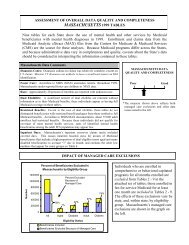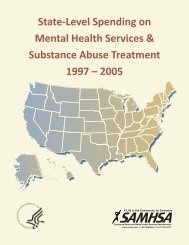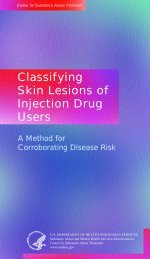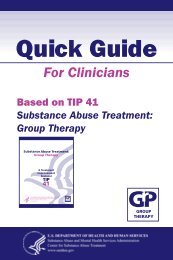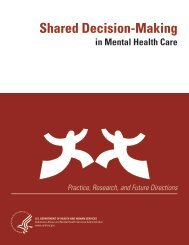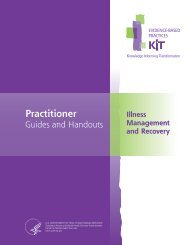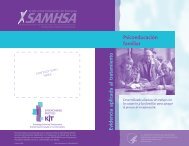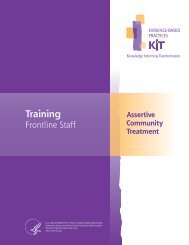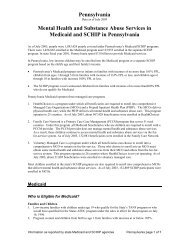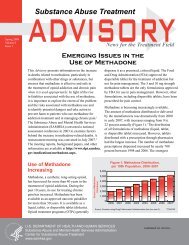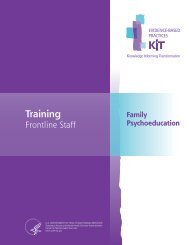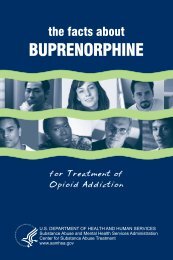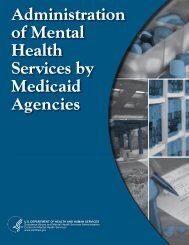TAP 21 - SAMHSA Store - Substance Abuse and Mental Health ...
TAP 21 - SAMHSA Store - Substance Abuse and Mental Health ...
TAP 21 - SAMHSA Store - Substance Abuse and Mental Health ...
You also want an ePaper? Increase the reach of your titles
YUMPU automatically turns print PDFs into web optimized ePapers that Google loves.
Addiction Counseling Competencies<br />
Appendix C – National Validation Study:<br />
Defining <strong>and</strong> Measuring the<br />
Competence of Addiction Counselors<br />
Introduction<br />
Paula K. Horvatich, Ph.D., <strong>and</strong> Jon F. Wergin, Ph.D.<br />
Virginia Commonwealth University 1<br />
The education of addiction counselors, once based on tradition, myth, <strong>and</strong> politics, is becoming<br />
increasingly professionalized, based on competencies, research, <strong>and</strong> best practice (Fisher 1997).<br />
Treatment for psychoactive substance abuse <strong>and</strong> dependence has traditionally been provided<br />
by addiction counselors. Although many counselors have academic degrees, many others have<br />
become counselors following personal experiences with treatment <strong>and</strong> recovery (Deitch &<br />
Carleton 1997). Formal education for addiction counselors has traditionally consisted of<br />
specialty training provided by treatment agencies, professional or certification organizations,<br />
or human service programs of community colleges that confer associate’s degrees. Certification<br />
of addiction counselors varies from State to State but usually requires a high school diploma<br />
<strong>and</strong> a specified number of years of experience in the field. A bachelor’s degree is required in<br />
only some States. In others, addiction counselors require no certification as long as they work<br />
in a State-approved facility.<br />
Because of a variety of policy <strong>and</strong> economic factors, training requirements for certification in<br />
addiction counseling have become more rigorous. These factors include, among others, the<br />
pervasiveness <strong>and</strong> effect of substance abuse on society, exp<strong>and</strong>ed treatment research efforts,<br />
<strong>and</strong> managed behavioral health care. If substance use problems were not so widespread <strong>and</strong><br />
costly to society, there would be less interest in the credentials of addiction counselors <strong>and</strong> the<br />
outcomes of the treatment they provide.<br />
Although treatment research has grown rapidly <strong>and</strong> has provided useful insights, new information<br />
will be useless unless it is implemented by frontline practitioners. Addiction counselors<br />
must be able to underst<strong>and</strong> <strong>and</strong> apply new knowledge, but traditionally these connections have<br />
not been made (Fisher 1997).<br />
Efforts to make treatment more efficient have resulted in the integration of substance abuse<br />
treatment with mental health services, thereby increasing the role of mental health <strong>and</strong> other<br />
healthcare professionals in substance abuse treatment. Addiction specialties have emerged<br />
in medicine, nursing, social work, psychology, <strong>and</strong> counseling, including rehabilitation<br />
counseling. Managed care has made it increasingly likely that master’s-level addiction<br />
1<br />
An earlier version of this paper was presented at the American Educational Research Association Annual Meeting,<br />
April 13–17, 1998, in San Diego, California. This study was funded by the <strong>Substance</strong> <strong>Abuse</strong> <strong>and</strong> <strong>Mental</strong> <strong>Health</strong><br />
Services Administration’s Center for <strong>Substance</strong> <strong>Abuse</strong> Treatment Grant Number 5U98 TI 00837. The original<br />
version is archived on the Education Resources Information Center (ERIC) Web site (http://www.eric.ed.gov) under<br />
ERIC document number ED422545.<br />
188



